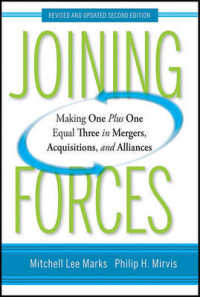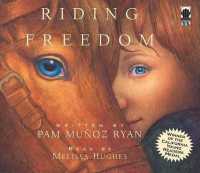- ホーム
- > 洋書
- > 英文書
- > History / World
Full Description
Critically exploring medical thought in a cultural milieu with no discernible influence from the European Enlightenment, Being Human in a Buddhist World reveals an otherwise unnoticed intersection of early modern sensibilities and religious values in traditional Tibetan medicine. It further studies the adaptation of Buddhist concepts and values to medical concerns and suggests important dimensions of Buddhism's role in the development of Asian and global civilization. Through its unique focus and sophisticated reading of source materials, Being Human adds a crucial chapter in the larger historiography of science and religion. The book opens with the bold achievements in Tibetan medical illustration, commentary, and institution building during the period of the Fifth Dalai Lama and his regent, Desi Sangye Gyatso, then looks back to the work of earlier thinkers, tracing a strategically astute dialectic between scriptural and empirical authority on questions of history and the nature of human anatomy.
It follows key differences between medicine and Buddhism in attitudes toward gender and sex and the moral character of the physician, who had to serve both the patient's and the practitioner's well-being. Being Human in a Buddhist World ultimately finds that Tibetan medical scholars absorbed ethical and epistemological categories from Buddhism yet shied away from ideal systems and absolutes, instead embracing the imperfectability of the human condition.
Contents
List of Illustrations Acknowledgments A Technical Note Abbreviations Introduction Part I: In the Capital 1. Reading Paintings, Painting the Medical, Medicalizing the State 2. Anatomy of an Attitude: Medicine Comes of Age Part II: Bones of Contention 3. The Word of the Buddha 4. The Evidence of the Body: Medical Channels. Tantric Knowing 5. Tangled Up in System: The Heart, in the Text and in the Hand Coda: Influence, Rhetoric, and Riding Two Horses at Once Part III: Roots of the Profession 6. Women and Gender 7. The Ethics of Being Human: The Doctor's Formation in a Material Realm Conclusion: Ways and Means for Medicine Notes Bibliographies Index








